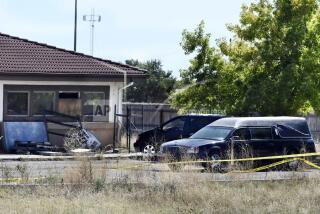Mortuary Hit With $10-Million AIDS Discrimination Suit
- Share via
Shortly before putting a gun to his head and pulling the trigger, Blair Robert Hunter scrawled a suicide note that summarized the isolation he felt as a 26-year-old gay man, frustrated by discrimination and fearful of AIDS.
“He said, ‘If something isn’t done, it will be like a big witch hunt,’ ” said his mother, Nancy Dorman. “He was becoming a total paranoid over people thinking he had (the incurable disease). He thought he would end up in a concentration camp.”
Five weeks after Hunter died from the self-inflicted, .38-caliber gunshot wound, a lawsuit contends that even in death he could not escape the hysteria. On Tuesday, his mother accused Los Angeles’ Forest Lawn Mortuary of causing an emotionally painful two-hour delay in the funeral service because embalmers thought his body carried the acquired immune deficiency syndrome virus.
Seeking damages in excess of $10 million, it is the first AIDS discrimination case filed against a funeral home in Los Angeles County, according to several experts. But funeral home complaints much like it, they say, are being leveled with more and more frequency by families of AIDS victims.
The lawsuit accuses Forest Lawn, among the nation’s best-known funeral home and cemetery operators, of a dozen violations of state business and professional codes. The accusations range from breach of contract and unlicensed medical diagnosis to the intentional infliction of emotional distress.
Dick Fisher, a spokesman for Forest Lawn, said the mortuary had no idea the deceased may have had AIDS until the body came from the coroner’s office red-tagged in a manner indicating that it had been infected with a communicable disease.
The company’s general counsel, David Pies, said Forest Lawn does not have “any policy of discrimination.” He acknowledged that the firm usually uses “outside embalmers” to handle AIDS victims because “some of our people prefer that they not do that kind of work.”
The lawsuit filed by Hunter’s mother and two family friends contends that Forest Lawn officials “unreasonably” balked at embalming the body “while the entire funeral party was waiting in a grief-stricken, confused and nearly hysterical state in the funeral chapel.”
In addition, it contends that when officials tried to explain the delay, they callously revealed to a family representative that Hunter, who lived in Long Beach, was thought to have AIDS.
The unemployed hairdresser had been tested for the illness just before his Aug. 25 suicide, but he had not received the results, according to his mother’s lawyer, Robert L. Kennedy. (Test results are usually confidential, and Kennedy said the results are still unclear.)
When police discovered the body in Hunter’s apartment, however, they found an appointment card from a local AIDS clinic and classified the death as that of a possible AIDS victim, Kennedy said.
That should have alerted Forest Lawn, the suit contends. But when the Aug. 29 viewing service failed to begin on time, funeral officials blamed family and friends for not telling them that the body might carry AIDS, the complaint says. In fact, the suit continues, no one in the family knew.
AIDS, a fatal disease found mostly in homosexuals and intravenous drug abusers, is thought to be transmitted only through sexual activity or an exchange of bodily fluids. Unless proper precautions are taken, funeral workers can come in contact with such fluids during the embalming process.
“While there is a risk, the risk is minimal and acceptable,” said David Bohardt, executive director of the Milwaukee-based National Funeral Directors Assn. “Funeral directors should not be any more or any less concerned about AIDS than they are about any other communicable disease, like hepatitis.
“There isn’t any clear trend (of lawsuits) nationwide. But it is also clear that some funeral homes are refusing to serve families of AIDS victims.”
“Over time, there certainly have been specific incidents where (funeral) services were denied or held up,” said Dr. Martin Finn, a member of the Los Angeles City-County AIDS Task Force. “I guess we will have more and more deaths with time, and an ongoing problem. I can understand the anxiety.”
More to Read
Sign up for Essential California
The most important California stories and recommendations in your inbox every morning.
You may occasionally receive promotional content from the Los Angeles Times.











